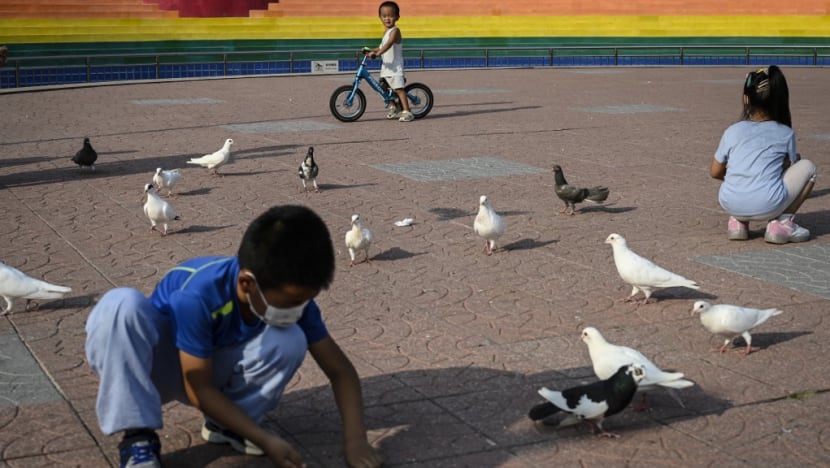Commentary: China’s young ‘lie flat’ under social challenges
Those "lying flat" instead of having babies increase official worries about the fall in China’s birth rate, says this writer.

People walk along a pedestrian street surrounded by shops and shopping malls in Shanghai on Oct 24, 2022. (Photo: AFP/Hector Retamal)
HOUSTON: The "lying flat" or "tang ping" movement is a phenomenon that emerged in China in 2021.
It describes the generations born in the late 1990s and 2000s who, disappointed by their lack of social mobility and economic stagnation, have decided to "not strive for their futures". They do not want to follow the values of hard work, home ownership, marriage or living standards sought after by past generations.
Ever since the lying flat movement resonated with younger netizens, the Chinese government has sought to put the fire out by restoring the good old values of past generations. The question is why the movement has spread among Chinese youth despite 40 years of economic prosperity. The reality is that Chinese GDP growth has steadily declined since 2010.
GDP growth had already dropped from 10.6 per cent to 6 per cent before the COVID-19 pandemic. Now an economic downturn — due to worldwide inflation from the pandemic, the Ukraine war and economic sanctions — threatens to end the golden period of Chinese prosperity.
Increasing tensions between the United States and China, numerous lockdowns due to China’s zero-COVID policy, a looming property crisis and declining employment for unskilled workers have cast further doubts on the future of China.
POWERLESSNESS
Active Internet censorship and other measures restricting freedom of speech mean that tang ping is a silent revolution representing the powerlessness of young people who know they will never achieve the same living standards as their parents or grandparents.
Though it is just a silent revolution, the Chinese Communist Party (CCP) is cautious about its potential impact on society. State-owned media, such as Xinhua and other platforms, have been utilised by the CCP to condemn the movement.

The CCP also has demographic grounds on which to be concerned. China moved from the one-child policy to a two-children policy in 2015, encouraging people to have as many babies as they can, although the official policy is three, to maintain the health of the pension system and labour force. Those lying flat instead of having babies increase official worries about the five years-long fall in China’s birth rate.
The lying flat movement could also scare off foreign investors and lower labour productivity. Economic development is vital for the CCP, so a significant depreciation in human capital is unlikely to be tolerated.
Perhaps most importantly, the notion of lying flat signifies to the Chinese people, the CCP and the world that China is declining under President Xi Jinping’s rule. It implies that Xi is incapable of motivating younger people to strive for the nation.
STOPPING THE PHENOMENON FROM SPREADING
Officials could attribute the lying flat phenomenon to economic changes, such as rising house prices and disruptions to global supply chains, but Xi’s third-term ambitions make him unlikely to tolerate voices of dissent. That could explain why the CCP wants to stop the phenomenon from spreading.
Related:
But the lying flat movement is unlikely to challenge the CCP’s rule — especially in the short run. The lack of desire among those lying flat to officially organise themselves and change the status quo renders the movement a passive force that helps young people accept the harsh realities of life.
Those lying flat are similar to the generation of NEETS (Not in Education, Employment or Training) who emerged in Japan in the early 2000s. They are young Japanese people who stay at home, rely on their parents for basic needs and do not want to join the labour force. The lying flat and NEET movements both reflect the increasing challenges that younger people face in Japan and China.
China depends on economic development, but it remains unclear how the CCP and Xi will confront the lying flat movement. Unless they believe suppression is the only option, one way for the party and its president to maintain political legitimacy would be to provide new social and economic opportunities for younger generations.
Yao-Yuan Yeh is Fayez Sarofim – Cullen Trust for Higher Education Endowed Chair in International Studies, Department Chair of International Studies & Modern Languages, and Department Chair of Political Science at the University of St Thomas, Houston. This commentary first appeared on East Asia Forum.















